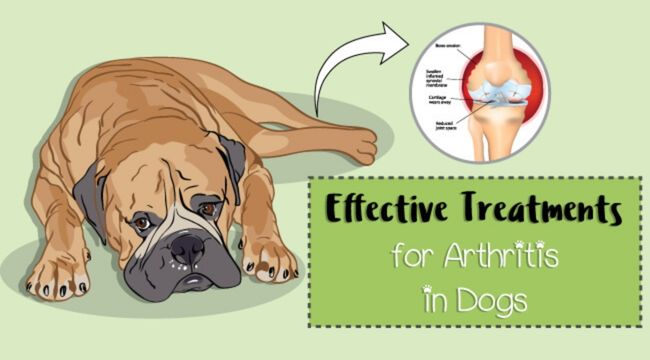
Waghound.com is an Amazon Associate, and we earn from qualifying purchases.
Arthritis in dogs is a condition that affects about 20% of dogs by the time they are a year old and about 80% of dogs by the time they reach eight years of age. Unfortunately, it’s true—arthritis doesn’t only affect older dogs. If you notice your dog wobbling around without any reason, there is a chance they may be affected by arthritis.
Arthritis can affect a dog in the very early stages of life, yet the symptoms may not be visible until later on.
While arthritis can’t ever be completely cured, there are some natural remedies for dog arthritis to help maintain your dog’s quality of life.
Arthritis is a degenerative disorder; it causes a lot of pain and inhibits mobility. It leads to a decreased quality of life because it limits your dog’s movement.
If you want to know about arthritic dogs and what you can do to help them, you’re in the right place. I have compiled a guide about arthritis in dogs and its treatment options. Read on to find out more.
What is Arthritis in Dogs?

Arthritis can be defined as any abnormal changes (inflammation) in one or more joints. The change may be due to any number of causes and can be extremely painful.
Arthritis is characterized by restricted mobility, lameness, and extreme discomfort.
For example, a dog suffering from hip dysplasia—which is an abnormal formation of the hip socket—may get painful arthritis if the problem persists and becomes severe.
Osteoarthritis is the most common form of arthritis and is a degenerative disease.
How is Arthritis in Dogs Caused?

Arthritis may be caused due to injury, developmental disorders, aging, or in some cases, it’s just hereditary.
Let’s delve a little deeper into the subject.
While older dogs may get arthritis due to the gradual abrasion of protective cartilage over time, a younger dog that may have suffered an injury or joint problem may get arthritis due to dislocation or infection.
Some dogs may also have genetic conditions like hip dysplasia which may lead to arthritis in the future and, if a dog is obese, they may experience a lot of stress on the joints and muscles, which will lead to arthritis problems.
Identifying Arthritis in Dogs

If your dog has arthritis, you may notice them walking with a slight limp or in a very rigid manner. Also, you may find they become unable to handle certain positions as it becomes increasingly difficult for them to sit or stand up.
Here are some symptoms you should look out for:
- Widespread stiffness
- Lameness
- Slow movement
- Restricted mobility
- Muscle wastage
- Abnormal gait
Diagnosis of Arthritis in Dogs
It’s best to take your dog to a vet for a thorough examination and diagnosis of the disease instead of self-diagnosing to give him the best possible care and treatment.
Some of the methods your vet may use include ultrasound scanning, extracting fluids from joints for diagnosis, or nuclear scintigraphy.
How to Treat Arthritis in Dogs?
While there is no permanent cure for arthritis, you can help prolong a good quality of life for your dog suffering from arthritis by taking some simple steps; there are actually many natural remedies for dog arthritis.
Some of the steps you can take include:
#1. Improve the Quality of Bedding:
Give a well-padded bed to your dog, away from cold and damp drafts, and if possible, add ramps so that your dog can easily get into and out of his bed. Also, try to opt for non-skid flooring wherever possible.
#2. Massage and Warm Compress:
Give your dog a good body massage every once in a while to help stimulate blood flow. You can also apply a warm compress over sore joints—the heat will help relieve aching joints.
Use a hot water bottle or blanket for best results, but make sure the compress you are giving is not too hot—you don’t want them to get burned!
#3. Exercising Your Dog:
Allow your dog to exercise moderately every day to keep muscles active; however, be careful not to stress them too much.
Too much exercise can lead to pain, whereas too little will make the arthritic condition of your dog worse. You can judge from the way they interact and move after exercise.
For arthritic dogs, you can always begin with a nice slow warm-up, like a low-impact short walk. Gradually, allow them to move a bit faster once they’ve warmed up for a minute or two.
Other popular exercise choices for arthritic dogs include swimming, leash walking, short hikes (go for trails with low inclines), and little indoor play sessions.
After all, you want your pet to be happy and in shape. (The idea is to help them with mobility, not tire them out)
In addition, you can also start by giving them natural food products and supplements, physiotherapy, acupuncture, etc., for arthritis treatment.
#4. Giving the Right Diet to Your Dog:
Keep in mind that nutrition plays a vital role in maintaining the quality of life for your dog, especially when they’re struggling with arthritis.
Certain foods like grains, potatoes, peppers, and tomatoes are known to increase arthritis-related inflammation. On the other hand, foods like celery, alfalfa sprouts, apple cider vinegar (raw organic with the mother of vinegar), mangos, and papayas are all very good for dogs with arthritis.
Read a list of the do’s and don’ts at the end of our article to get a clear guideline on the measures you can take.
Natural Remedies for Dogs With Arthritis:
As stated above, the importance of diet and supplements in the treatment of arthritis should never be underestimated, so we’ve listed some of the natural herbs and anti-inflammatories that you can give your dog for arthritis.
Natural Anti-Inflammatory for Dogs:
#1. Fish Oils:
A rich source of Omega-3 fatty acids, fish oils are known to reduce inflammation and are also excellent for your dog’s overall health, including their coat and skin. Add a fish oil capsule to your dog’s diet or give him food with a high amount of fish oil in it to maintain his health.
Make sure to add Vitamin E with fish oil in order to maintain the perfect balance.
#2. Vitamin C:
Give your dogs high doses of vitamin C in ascorbate form; also, try to find a source that contains flavonoids.
Herbs for the Treatment of Arthritis in Dogs:
A number of herbs may also help in the treatment of arthritis. They are:
#1. Arnica:
Arnica is an excellent anti-inflammatory agent that can help relieve pains. The flower heads are used externally and to make massage oils.
#2. Boswellia:
This herb helps prevent inflammation by shrinking inflamed tissues by improving circulation and synovial fluid viscosity. Since it’s bitter in nature, it’s easiest to find it in capsule form.
#3. Cayenne:
When applied topically, cayenne pepper improves circulation around joints and other areas where there might be the pain.
#4. Comfrey:
Allantoin is a compound in the body that helps cells grow; it accelerates the rate at which not only wounds but also broken bones are healed. Comfrey is one of the most important sources of Allantoin.
It must not be used internally—it should be applied as a rinse or tincture (alcohol-based). If consumed, it may lead to liver toxicity.
#5. Devil’s Claw Root:
This is an anti-inflammatory herb that stimulates the lymph system and helps the body with detoxification. It can be consumed in capsule form.
#6. Ginger:
This famous kitchen spice is a warming anti-inflammatory agent that improves circulation and digestion. Add a bit of ginger to your dog’s diet.
#7. Licorice Root:
An anti-inflammatory agent that reduces joint pain, it also helps to improve your dog’s digestion and respiration. But be careful—because large quantities of this root may lead to hypertension and hormonal imbalances.
#8. Meadowsweet:
This one is a great herb with not only anti-inflammatory properties but it also contains anti-analgesic, anti-rheumatic and rubefacient properties.
This is a natural “aspirin” due to the compounds present in its leaves, roots, and flowers. Remember: Don’t take it with NSAIDs—it will have adverse effects.
#9. Turmeric:
Curcumin in turmeric is a vital anti-inflammatory compound and can be compared to ibuprofen. Add a bit of a golden turmeric paste to your dog’s daily diet for best results.
#10. Yucca:
The chemicals in yucca help to reduce pain, the swelling of joints and stiffness. If taken in large doses, it may lead to irritation of the stomach lining resulting in vomiting.
Related Read: Guide To Buying The Best Dog Food For Sensitive Stomach
Essential Oils:
Did you know that one of the most famous natural remedies for dog arthritis is essential oils? Plants that have medicinal value are distilled into essential oils, providing natural pain relief. To know about CBD oil, visit this website.
The aroma of the essential oils is not the source of its healing properties but rather the chemical constituents of the oil itself.
Essential oils can be administered in the following manner to your dog:
- Spraying:
- By using an electric diffuser to spread (aka “diffuse”) it around the room.
- By spraying it from a spray bottle. To make the spray, just add a few drops of oil to a bottle of water—it’s best to use a glass water bottle.
- During a Shower:
- Add essentials oil to your dog’s unscented shampoo as you bathe your dog.
- Add a few drops of essential oil to water and bathe your dog.
- Other Means:
- Put a drop of oil on your dog’s personal belongings, like their collar and bed.
- Rub a bit of essential oil through your dog’s fur.
Other Natural Remedies:
Other natural remedies for dog arthritis include:
- Hydrotherapy
- Acupuncture
- Cold packs
- Warm packs
- Electric shock wave therapy
- Thick orthopedic beds
Supplements for Arthritis in Dogs:
You can also use supplements to treat arthritis in dogs; the most commonly used supplements are omega-3 fatty acids, selenium, vitamin E, glucosamine sulfate, chondroitin sulfate, and DLPA.
#1. Glucosamine and Chondroitin
Nutraceutical supplements called glycosaminoglycan (GAG) play an important role in the treatment of arthritis.
GAGs include glucosamine and chondroitin sulfate, which are extracted from mussel, cartilage, and shells of shellfish.
It is essential to understand that nutritional supplements will not necessarily correct your dog’s structural damage.
However, they will help improve the body’s ability to repair and strengthen joint tissues and decrease inflammation.
#2. DLPA
DLPA stands for dl-phenylalanine, an amino acid used to treat chronic pain. In the case of dogs, in consultation with your vet, administer DLPA (2 or three times a day in most cases).
Painkillers for Arthritis in Dogs:
When supplements do not work, sometimes it is important to resort to painkillers for support. Here we have discussed two for your reference.
#1. NSAIDs (Non-Steroidal Anti-Inflammatory Drugs)
These drugs are basically painkillers and are required for chronic pain due to arthritis.
Though these drugs are used, they can be quite dangerous for our canine friends because usage may lead to gastrointestinal problems, liver or even kidney failure.
Now coming back, we know the dangers these drugs may pose; hence, the question remains: why should they be given, and how should they be administered?
Well, in the worst-case scenarios, arthritis cannot be controlled by natural remedies alone to maintain your dog’s health even then, NSAIDs may be used.
To explain a bit further, inflammation creates a cycle of cartilage breakdown which leads to pain which leads to your dog becoming inactive and gaining more weight—and the cycle continues.
How to Give NSAID to Your Dog Safely?
They can be safely administered in consultation with a vet. You would first have to take your dog for a thorough examination before deciding how much is to be administered.
Secondly, make sure to give it to him on a full stomach or along with food, because taken on an empty stomach, it may lead to severe consequences.
And finally, make sure not to combine NSAIDs together with any other medicines; use extra caution while changing from one NSAID to another.
#2. Tramadol
Tramadol is yet another painkiller you can give your dog in place of NSAIDs. It’s quite safe without the effects of sedation or addiction.
You may give this to your dog on a regular basis or on an as-required basis, but make sure to consult your vet first.
Related Read: Dog Vaccination Guide: The Right Vaccination & Schedule
Do’s and Don’ts for Your Arthritic Dog:
Now that we have discussed most of the most common natural remedies, here’s a list of do’s and don’ts you’ll have to keep in mind if your dog suffers from arthritis.
Dos:
- First and foremost: get a proper diagnosis. Then, visit the vet regularly for checkups to come up with a plan to treat your dog’s arthritis and measure his progress.
- Give your dog high-quality food and keep their weight under control in order to decrease the load on their joints.
- Take your dog for controlled workouts—be it walks or runs—and be careful while you do so. It would be best if you can find a soft surface for your dog to exercise.
- If your dog has severe arthritis, in consultation with your vet, consider going for surgery (after weighing the pros and cons).
- As we stated before, try to adjust to his environment at home so that he can be comfortable. This includes proper bedding, ramp, carpeting, hard floors, etc.
- Keep his food bowl at an optimum, comfortable level.
Don’ts:
- Don’t self-diagnose your dog’s condition.
- Don’t make your dog work out so much that it puts a strain on his body. Make sure you never discontinue his workouts; simply adjust according to his comfort.
- Don’t allow your dog to gain extra weight.
- Don’t allow him to fall or slip. If your dog does fall, slip or have any other accident, make sure to take him to the vet to get a quick checkup.
- Don’t administer medication without consulting a vet.
In Conclusion:
We hope you’ve found this comprehensive guide useful and informative about dog arthritis and its treatments.
We want to encourage you to take the necessary steps to give your dog the best possible care.
Share this article with other dog owners who you think can be benefitted. And most importantly, don’t forget to take your dog for a wellness checkup every once in a while.
After all, our pets deserve all the love and care in the world.



